Dementia Discussion: Patient Care, Feelings, and Daily Life Impact
VerifiedAdded on 2022/09/15
|7
|1637
|18
Discussion Board Post
AI Summary
This discussion board post presents an analysis of a dementia case study, exploring the signs and symptoms of dementia, such as memory loss, constant crying, and decreased mobility, as observed in Mrs. Smith. The discussion addresses the challenges faced by caregivers, particularly Julie, Mrs. Smith's daughter, who struggles to balance work and caregiving responsibilities. The post identifies resources needed, including counseling, caregiver support, and community centers. It further examines the employer's role in supporting Julie and the financial costs associated with dementia care, including medication, food, and caregiver expenses. The discussion also delves into the emotional impact on relatives, personal reflections on how one would like to be cared for if they had dementia, and how dementia affects daily life. The author reflects on the learning experience and provides a self-assessment of their work, along with a list of relevant references.

Running head: DISCUSION
Dementia
Name
ID
Course
Unit
Lecturer
Date
Dementia
Name
ID
Course
Unit
Lecturer
Date
Paraphrase This Document
Need a fresh take? Get an instant paraphrase of this document with our AI Paraphraser
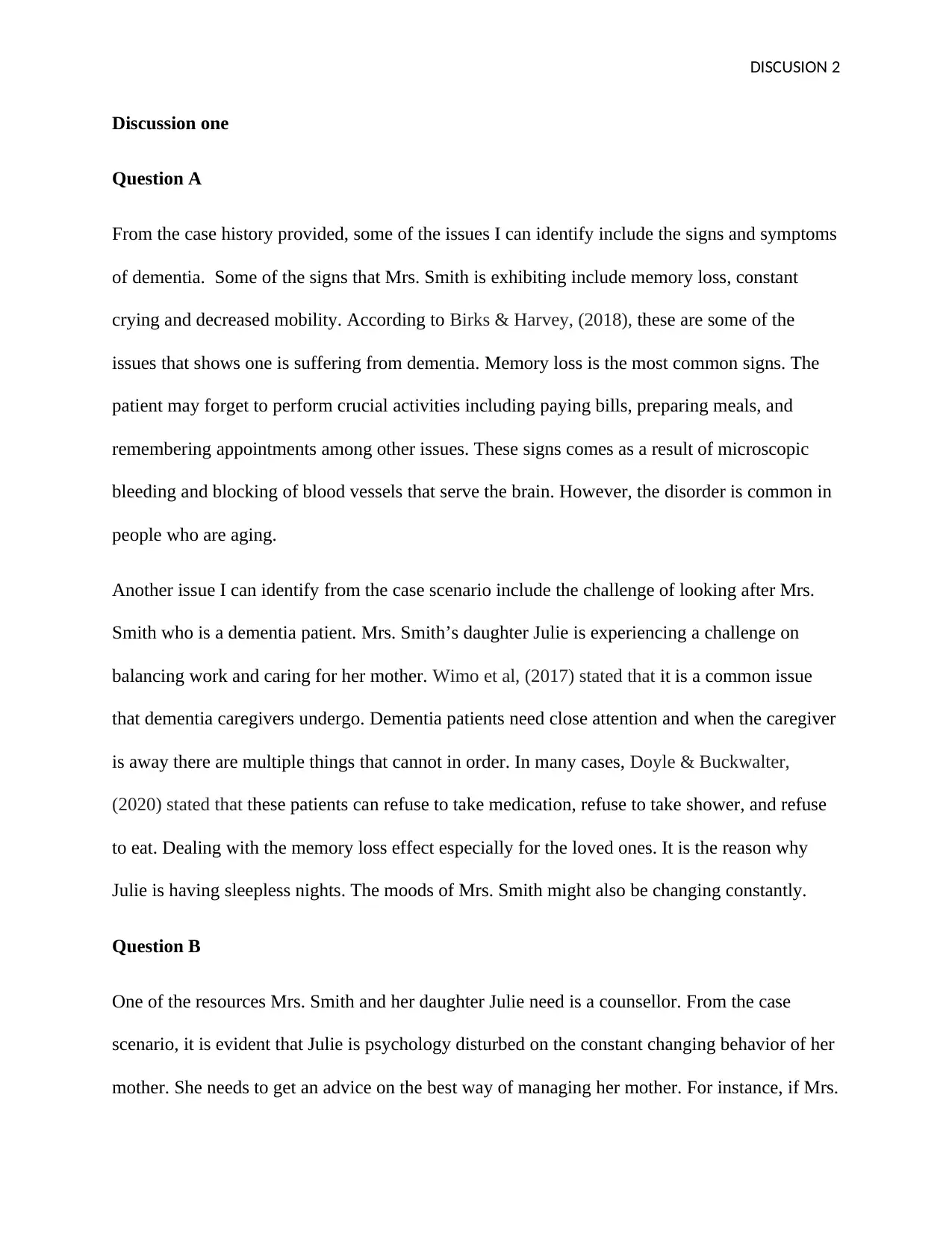
DISCUSION 2
Discussion one
Question A
From the case history provided, some of the issues I can identify include the signs and symptoms
of dementia. Some of the signs that Mrs. Smith is exhibiting include memory loss, constant
crying and decreased mobility. According to Birks & Harvey, (2018), these are some of the
issues that shows one is suffering from dementia. Memory loss is the most common signs. The
patient may forget to perform crucial activities including paying bills, preparing meals, and
remembering appointments among other issues. These signs comes as a result of microscopic
bleeding and blocking of blood vessels that serve the brain. However, the disorder is common in
people who are aging.
Another issue I can identify from the case scenario include the challenge of looking after Mrs.
Smith who is a dementia patient. Mrs. Smith’s daughter Julie is experiencing a challenge on
balancing work and caring for her mother. Wimo et al, (2017) stated that it is a common issue
that dementia caregivers undergo. Dementia patients need close attention and when the caregiver
is away there are multiple things that cannot in order. In many cases, Doyle & Buckwalter,
(2020) stated that these patients can refuse to take medication, refuse to take shower, and refuse
to eat. Dealing with the memory loss effect especially for the loved ones. It is the reason why
Julie is having sleepless nights. The moods of Mrs. Smith might also be changing constantly.
Question B
One of the resources Mrs. Smith and her daughter Julie need is a counsellor. From the case
scenario, it is evident that Julie is psychology disturbed on the constant changing behavior of her
mother. She needs to get an advice on the best way of managing her mother. For instance, if Mrs.
Discussion one
Question A
From the case history provided, some of the issues I can identify include the signs and symptoms
of dementia. Some of the signs that Mrs. Smith is exhibiting include memory loss, constant
crying and decreased mobility. According to Birks & Harvey, (2018), these are some of the
issues that shows one is suffering from dementia. Memory loss is the most common signs. The
patient may forget to perform crucial activities including paying bills, preparing meals, and
remembering appointments among other issues. These signs comes as a result of microscopic
bleeding and blocking of blood vessels that serve the brain. However, the disorder is common in
people who are aging.
Another issue I can identify from the case scenario include the challenge of looking after Mrs.
Smith who is a dementia patient. Mrs. Smith’s daughter Julie is experiencing a challenge on
balancing work and caring for her mother. Wimo et al, (2017) stated that it is a common issue
that dementia caregivers undergo. Dementia patients need close attention and when the caregiver
is away there are multiple things that cannot in order. In many cases, Doyle & Buckwalter,
(2020) stated that these patients can refuse to take medication, refuse to take shower, and refuse
to eat. Dealing with the memory loss effect especially for the loved ones. It is the reason why
Julie is having sleepless nights. The moods of Mrs. Smith might also be changing constantly.
Question B
One of the resources Mrs. Smith and her daughter Julie need is a counsellor. From the case
scenario, it is evident that Julie is psychology disturbed on the constant changing behavior of her
mother. She needs to get an advice on the best way of managing her mother. For instance, if Mrs.
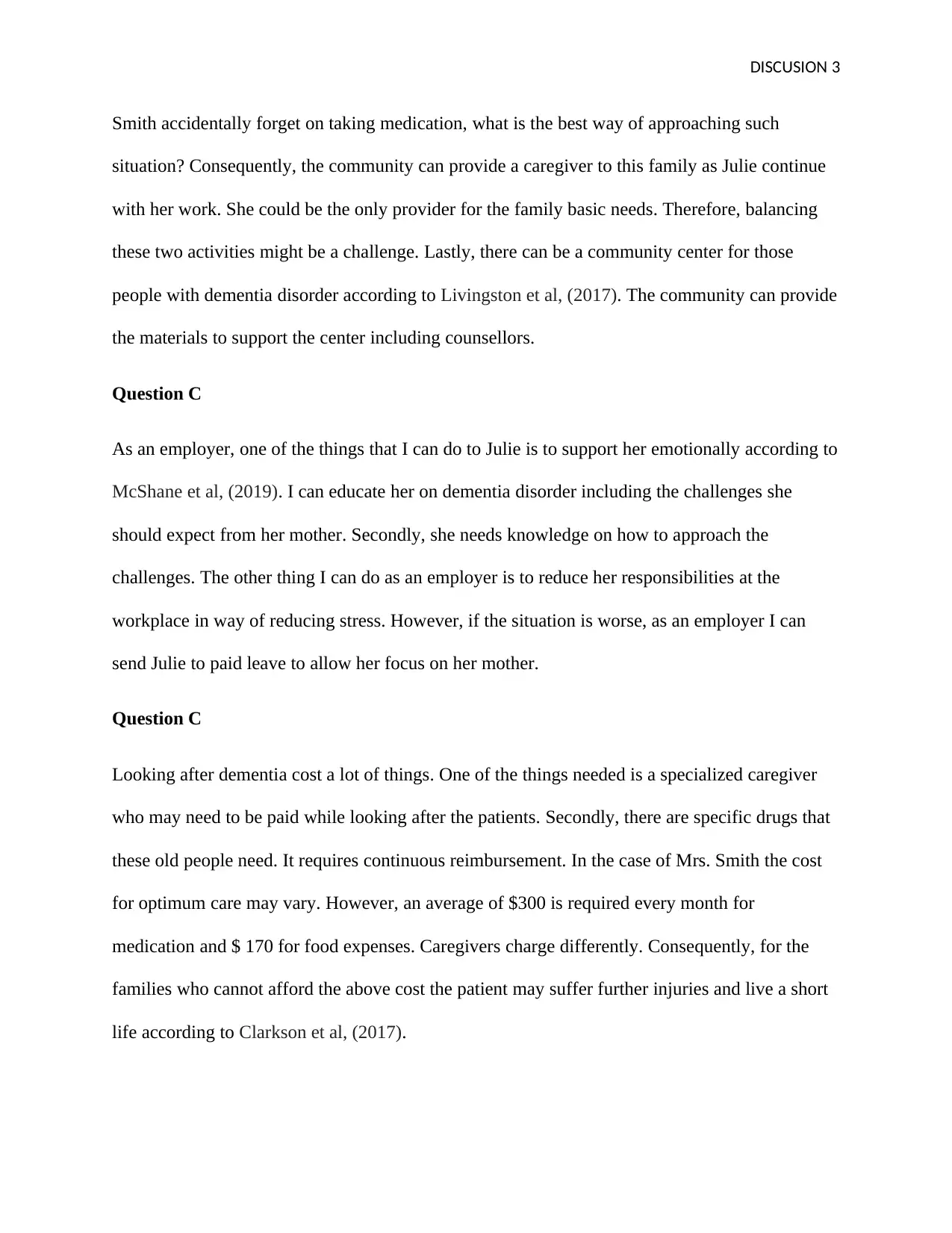
DISCUSION 3
Smith accidentally forget on taking medication, what is the best way of approaching such
situation? Consequently, the community can provide a caregiver to this family as Julie continue
with her work. She could be the only provider for the family basic needs. Therefore, balancing
these two activities might be a challenge. Lastly, there can be a community center for those
people with dementia disorder according to Livingston et al, (2017). The community can provide
the materials to support the center including counsellors.
Question C
As an employer, one of the things that I can do to Julie is to support her emotionally according to
McShane et al, (2019). I can educate her on dementia disorder including the challenges she
should expect from her mother. Secondly, she needs knowledge on how to approach the
challenges. The other thing I can do as an employer is to reduce her responsibilities at the
workplace in way of reducing stress. However, if the situation is worse, as an employer I can
send Julie to paid leave to allow her focus on her mother.
Question C
Looking after dementia cost a lot of things. One of the things needed is a specialized caregiver
who may need to be paid while looking after the patients. Secondly, there are specific drugs that
these old people need. It requires continuous reimbursement. In the case of Mrs. Smith the cost
for optimum care may vary. However, an average of $300 is required every month for
medication and $ 170 for food expenses. Caregivers charge differently. Consequently, for the
families who cannot afford the above cost the patient may suffer further injuries and live a short
life according to Clarkson et al, (2017).
Smith accidentally forget on taking medication, what is the best way of approaching such
situation? Consequently, the community can provide a caregiver to this family as Julie continue
with her work. She could be the only provider for the family basic needs. Therefore, balancing
these two activities might be a challenge. Lastly, there can be a community center for those
people with dementia disorder according to Livingston et al, (2017). The community can provide
the materials to support the center including counsellors.
Question C
As an employer, one of the things that I can do to Julie is to support her emotionally according to
McShane et al, (2019). I can educate her on dementia disorder including the challenges she
should expect from her mother. Secondly, she needs knowledge on how to approach the
challenges. The other thing I can do as an employer is to reduce her responsibilities at the
workplace in way of reducing stress. However, if the situation is worse, as an employer I can
send Julie to paid leave to allow her focus on her mother.
Question C
Looking after dementia cost a lot of things. One of the things needed is a specialized caregiver
who may need to be paid while looking after the patients. Secondly, there are specific drugs that
these old people need. It requires continuous reimbursement. In the case of Mrs. Smith the cost
for optimum care may vary. However, an average of $300 is required every month for
medication and $ 170 for food expenses. Caregivers charge differently. Consequently, for the
families who cannot afford the above cost the patient may suffer further injuries and live a short
life according to Clarkson et al, (2017).
⊘ This is a preview!⊘
Do you want full access?
Subscribe today to unlock all pages.

Trusted by 1+ million students worldwide
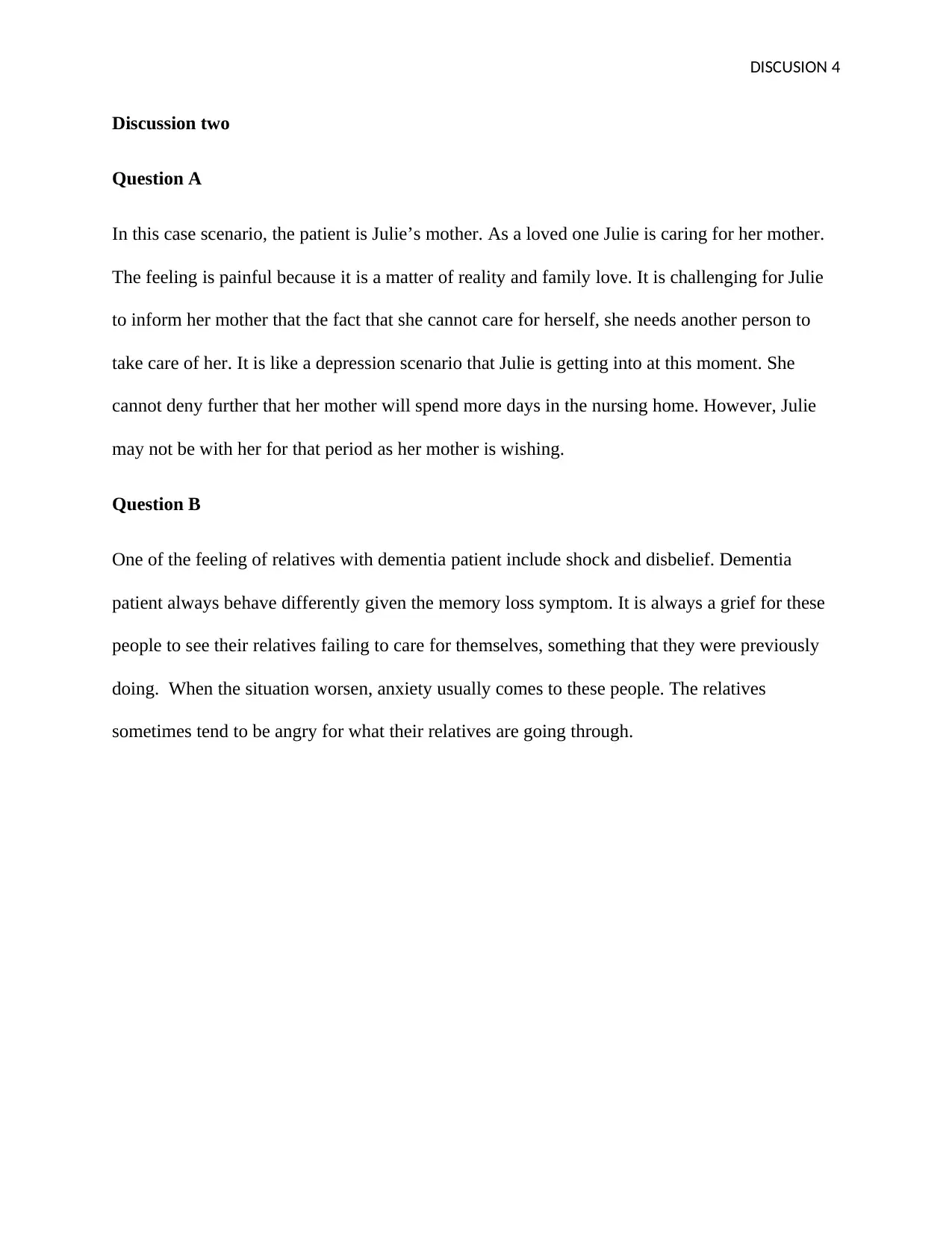
DISCUSION 4
Discussion two
Question A
In this case scenario, the patient is Julie’s mother. As a loved one Julie is caring for her mother.
The feeling is painful because it is a matter of reality and family love. It is challenging for Julie
to inform her mother that the fact that she cannot care for herself, she needs another person to
take care of her. It is like a depression scenario that Julie is getting into at this moment. She
cannot deny further that her mother will spend more days in the nursing home. However, Julie
may not be with her for that period as her mother is wishing.
Question B
One of the feeling of relatives with dementia patient include shock and disbelief. Dementia
patient always behave differently given the memory loss symptom. It is always a grief for these
people to see their relatives failing to care for themselves, something that they were previously
doing. When the situation worsen, anxiety usually comes to these people. The relatives
sometimes tend to be angry for what their relatives are going through.
Discussion two
Question A
In this case scenario, the patient is Julie’s mother. As a loved one Julie is caring for her mother.
The feeling is painful because it is a matter of reality and family love. It is challenging for Julie
to inform her mother that the fact that she cannot care for herself, she needs another person to
take care of her. It is like a depression scenario that Julie is getting into at this moment. She
cannot deny further that her mother will spend more days in the nursing home. However, Julie
may not be with her for that period as her mother is wishing.
Question B
One of the feeling of relatives with dementia patient include shock and disbelief. Dementia
patient always behave differently given the memory loss symptom. It is always a grief for these
people to see their relatives failing to care for themselves, something that they were previously
doing. When the situation worsen, anxiety usually comes to these people. The relatives
sometimes tend to be angry for what their relatives are going through.
Paraphrase This Document
Need a fresh take? Get an instant paraphrase of this document with our AI Paraphraser
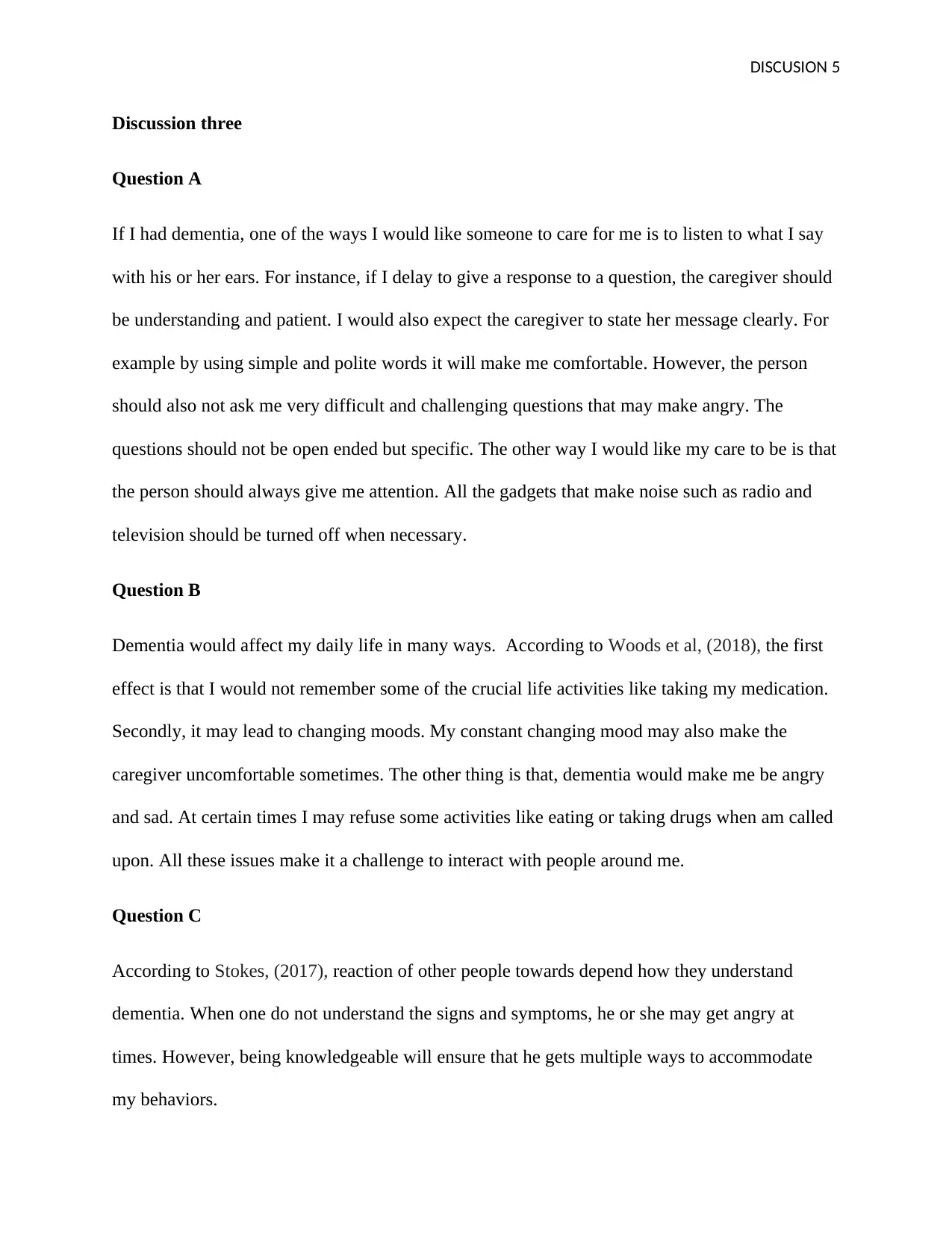
DISCUSION 5
Discussion three
Question A
If I had dementia, one of the ways I would like someone to care for me is to listen to what I say
with his or her ears. For instance, if I delay to give a response to a question, the caregiver should
be understanding and patient. I would also expect the caregiver to state her message clearly. For
example by using simple and polite words it will make me comfortable. However, the person
should also not ask me very difficult and challenging questions that may make angry. The
questions should not be open ended but specific. The other way I would like my care to be is that
the person should always give me attention. All the gadgets that make noise such as radio and
television should be turned off when necessary.
Question B
Dementia would affect my daily life in many ways. According to Woods et al, (2018), the first
effect is that I would not remember some of the crucial life activities like taking my medication.
Secondly, it may lead to changing moods. My constant changing mood may also make the
caregiver uncomfortable sometimes. The other thing is that, dementia would make me be angry
and sad. At certain times I may refuse some activities like eating or taking drugs when am called
upon. All these issues make it a challenge to interact with people around me.
Question C
According to Stokes, (2017), reaction of other people towards depend how they understand
dementia. When one do not understand the signs and symptoms, he or she may get angry at
times. However, being knowledgeable will ensure that he gets multiple ways to accommodate
my behaviors.
Discussion three
Question A
If I had dementia, one of the ways I would like someone to care for me is to listen to what I say
with his or her ears. For instance, if I delay to give a response to a question, the caregiver should
be understanding and patient. I would also expect the caregiver to state her message clearly. For
example by using simple and polite words it will make me comfortable. However, the person
should also not ask me very difficult and challenging questions that may make angry. The
questions should not be open ended but specific. The other way I would like my care to be is that
the person should always give me attention. All the gadgets that make noise such as radio and
television should be turned off when necessary.
Question B
Dementia would affect my daily life in many ways. According to Woods et al, (2018), the first
effect is that I would not remember some of the crucial life activities like taking my medication.
Secondly, it may lead to changing moods. My constant changing mood may also make the
caregiver uncomfortable sometimes. The other thing is that, dementia would make me be angry
and sad. At certain times I may refuse some activities like eating or taking drugs when am called
upon. All these issues make it a challenge to interact with people around me.
Question C
According to Stokes, (2017), reaction of other people towards depend how they understand
dementia. When one do not understand the signs and symptoms, he or she may get angry at
times. However, being knowledgeable will ensure that he gets multiple ways to accommodate
my behaviors.
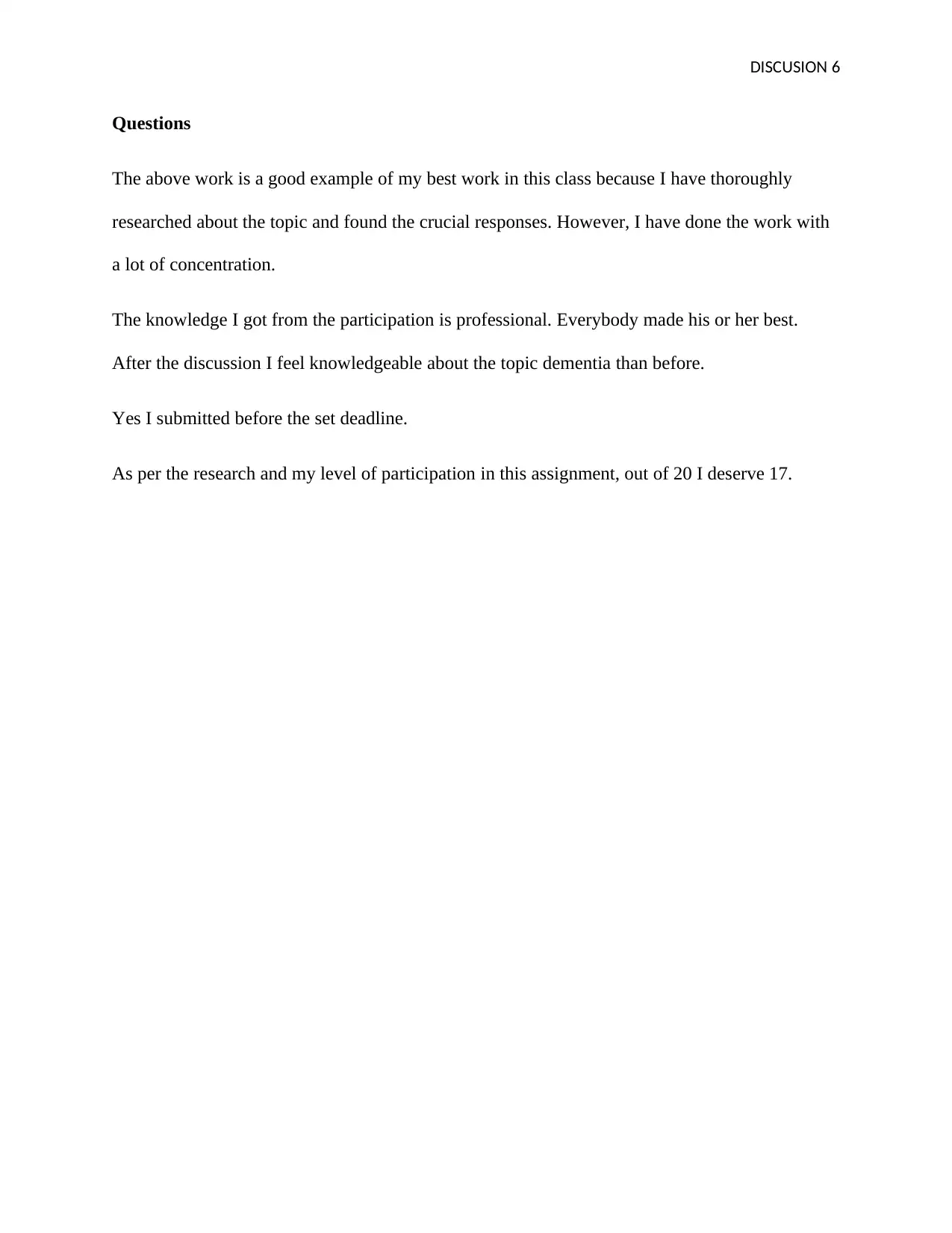
DISCUSION 6
Questions
The above work is a good example of my best work in this class because I have thoroughly
researched about the topic and found the crucial responses. However, I have done the work with
a lot of concentration.
The knowledge I got from the participation is professional. Everybody made his or her best.
After the discussion I feel knowledgeable about the topic dementia than before.
Yes I submitted before the set deadline.
As per the research and my level of participation in this assignment, out of 20 I deserve 17.
Questions
The above work is a good example of my best work in this class because I have thoroughly
researched about the topic and found the crucial responses. However, I have done the work with
a lot of concentration.
The knowledge I got from the participation is professional. Everybody made his or her best.
After the discussion I feel knowledgeable about the topic dementia than before.
Yes I submitted before the set deadline.
As per the research and my level of participation in this assignment, out of 20 I deserve 17.
⊘ This is a preview!⊘
Do you want full access?
Subscribe today to unlock all pages.

Trusted by 1+ million students worldwide
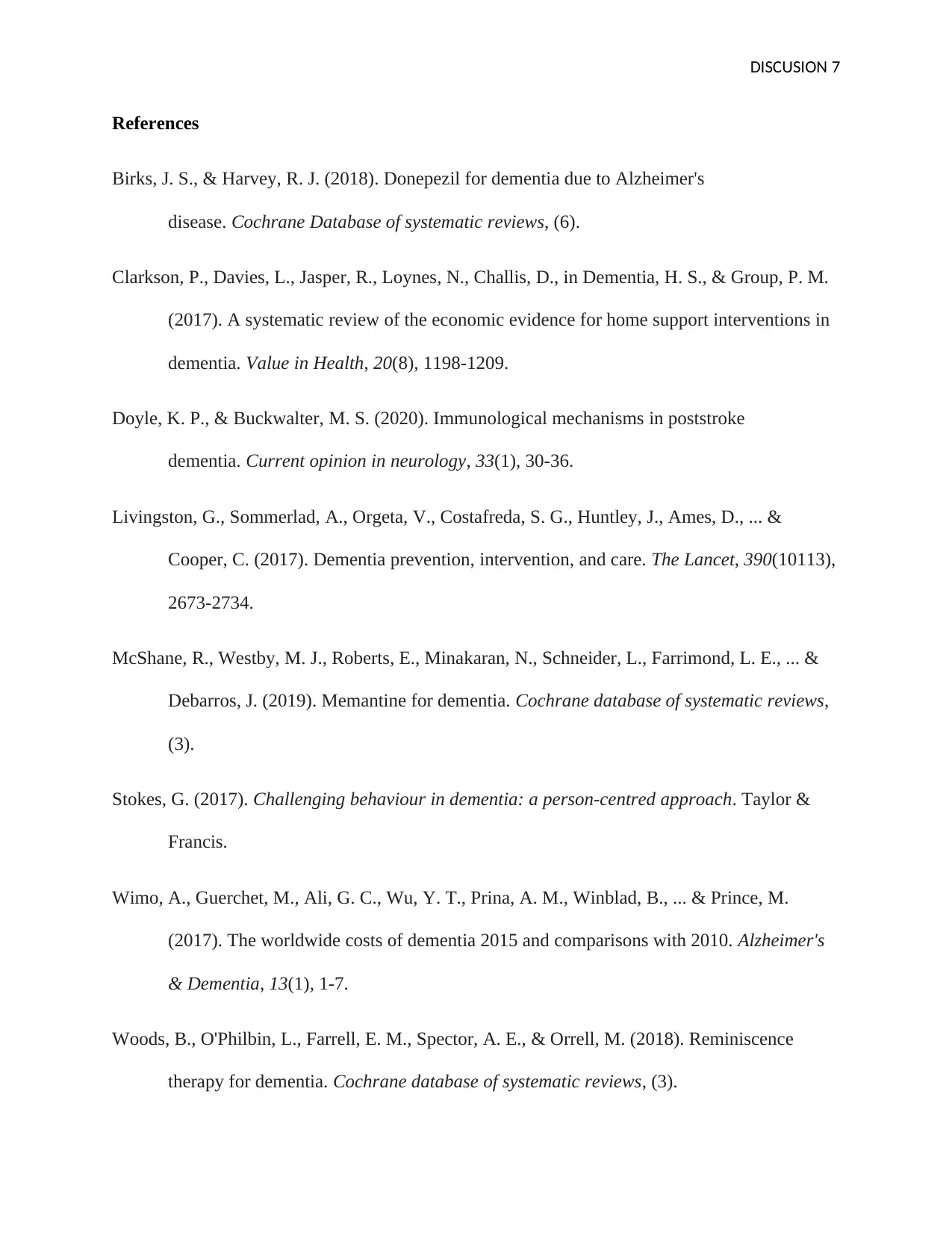
DISCUSION 7
References
Birks, J. S., & Harvey, R. J. (2018). Donepezil for dementia due to Alzheimer's
disease. Cochrane Database of systematic reviews, (6).
Clarkson, P., Davies, L., Jasper, R., Loynes, N., Challis, D., in Dementia, H. S., & Group, P. M.
(2017). A systematic review of the economic evidence for home support interventions in
dementia. Value in Health, 20(8), 1198-1209.
Doyle, K. P., & Buckwalter, M. S. (2020). Immunological mechanisms in poststroke
dementia. Current opinion in neurology, 33(1), 30-36.
Livingston, G., Sommerlad, A., Orgeta, V., Costafreda, S. G., Huntley, J., Ames, D., ... &
Cooper, C. (2017). Dementia prevention, intervention, and care. The Lancet, 390(10113),
2673-2734.
McShane, R., Westby, M. J., Roberts, E., Minakaran, N., Schneider, L., Farrimond, L. E., ... &
Debarros, J. (2019). Memantine for dementia. Cochrane database of systematic reviews,
(3).
Stokes, G. (2017). Challenging behaviour in dementia: a person-centred approach. Taylor &
Francis.
Wimo, A., Guerchet, M., Ali, G. C., Wu, Y. T., Prina, A. M., Winblad, B., ... & Prince, M.
(2017). The worldwide costs of dementia 2015 and comparisons with 2010. Alzheimer's
& Dementia, 13(1), 1-7.
Woods, B., O'Philbin, L., Farrell, E. M., Spector, A. E., & Orrell, M. (2018). Reminiscence
therapy for dementia. Cochrane database of systematic reviews, (3).
References
Birks, J. S., & Harvey, R. J. (2018). Donepezil for dementia due to Alzheimer's
disease. Cochrane Database of systematic reviews, (6).
Clarkson, P., Davies, L., Jasper, R., Loynes, N., Challis, D., in Dementia, H. S., & Group, P. M.
(2017). A systematic review of the economic evidence for home support interventions in
dementia. Value in Health, 20(8), 1198-1209.
Doyle, K. P., & Buckwalter, M. S. (2020). Immunological mechanisms in poststroke
dementia. Current opinion in neurology, 33(1), 30-36.
Livingston, G., Sommerlad, A., Orgeta, V., Costafreda, S. G., Huntley, J., Ames, D., ... &
Cooper, C. (2017). Dementia prevention, intervention, and care. The Lancet, 390(10113),
2673-2734.
McShane, R., Westby, M. J., Roberts, E., Minakaran, N., Schneider, L., Farrimond, L. E., ... &
Debarros, J. (2019). Memantine for dementia. Cochrane database of systematic reviews,
(3).
Stokes, G. (2017). Challenging behaviour in dementia: a person-centred approach. Taylor &
Francis.
Wimo, A., Guerchet, M., Ali, G. C., Wu, Y. T., Prina, A. M., Winblad, B., ... & Prince, M.
(2017). The worldwide costs of dementia 2015 and comparisons with 2010. Alzheimer's
& Dementia, 13(1), 1-7.
Woods, B., O'Philbin, L., Farrell, E. M., Spector, A. E., & Orrell, M. (2018). Reminiscence
therapy for dementia. Cochrane database of systematic reviews, (3).
1 out of 7
Related Documents
Your All-in-One AI-Powered Toolkit for Academic Success.
+13062052269
info@desklib.com
Available 24*7 on WhatsApp / Email
![[object Object]](/_next/static/media/star-bottom.7253800d.svg)
Unlock your academic potential
Copyright © 2020–2026 A2Z Services. All Rights Reserved. Developed and managed by ZUCOL.




